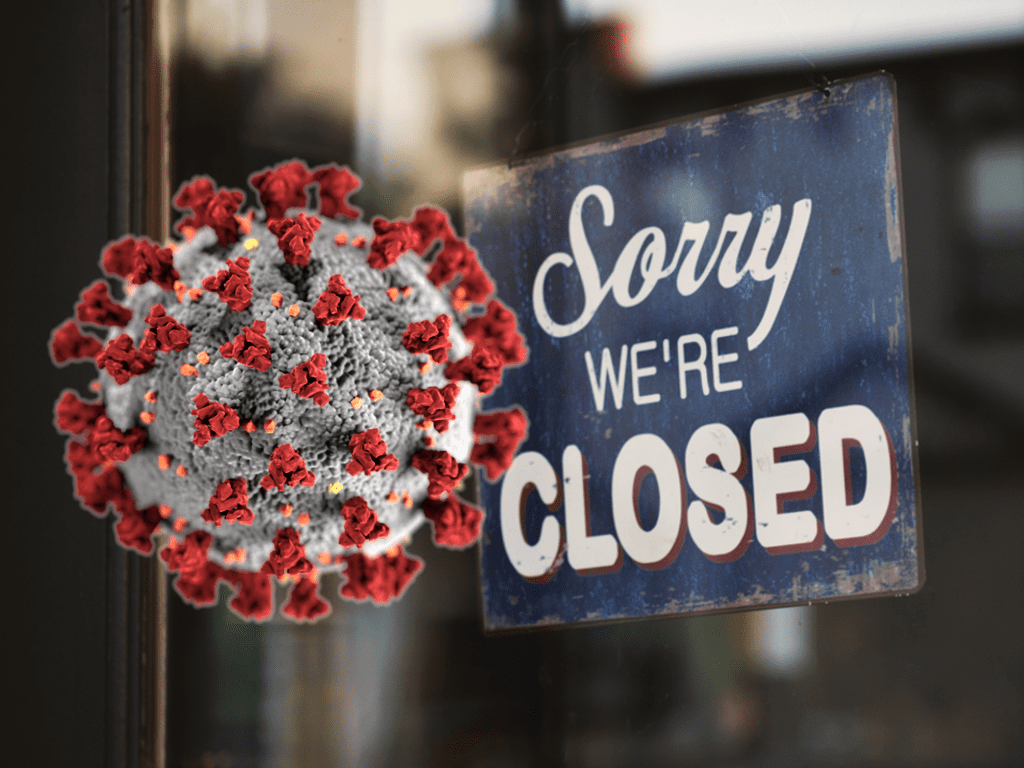The original reason for stay-at-home orders, aka lockdowns, was to “flatten the curve.” In other words, to prevent everyone from getting the virus all at once, thus overwhelming hospitals and resulting in unnecessary deaths from a lack of adequate care. As local and state governments gradually began to enact them, many rightfully argued that most people were practicing proper precautions and that in most areas, the cost of shutting down the economy outweighed the potential benefit from modestly reducing the spread.
While the debate has often been framed as “money vs. lives,” the damage that comes from shutting down the economy isn’t confined to a quarterly earnings report. It affects people’s livelihoods. Most companies don’t just have pots of gold lying around, and when they are prohibited from doing business for extended periods of time, layoffs are sure to come. And they sure did. The Wall Street Journal reports:
“The unemployment rate is seen topping out at 16% in the third quarter and declining to 9.5% by the end of 2021. But the CBO cautioned that those numbers understate the extent of damage because they only count people who are actively looking for a job.”
We are likely facing the worst unemployment rate since the Great Depression. Not good. But mass unemployment doesn’t just make it more difficult to bring food to the table. It often results in depression and, among many other things, a corresponding increase in suicides and drug overdoses. According to Reuters:
“A surge in unemployment to 20%—a forecast now common in Western economies—could cause an additional 20,000 suicides in Europe and the United States among those out of work or entering a near-empty job market.”
I opposed lockdowns in most areas because I believe their toll on the American worker and the resulting human cost outweighs the human cost to a likely modest increase in the transmission rate. Admittedly, there’s no way to truly prove what the rate would have looked like if most places didn’t have lockdowns, but hindsight does seem to indicate another key point. We are well past the day in which the most people are infected at once, and hospitals—even in hard-hit areas—are becoming less and less overwhelmed. Even New York Governor Andrew Cuomo said it’s likely his state is “past the plateau,” and that was over a week ago.
It’s even more evident when looking at less densely populated areas. As of writing, Brazos County hasn’t had a single recorded coronavirus death for nine days straight.
Now, I know what you’re thinking. “Wow, that was the best argument I’ve heard in my entire life. Let’s reopen the economy, starting yesterday!” Yes, I appreciate your enthusiasm, but there’s only one problem with that. Most Texans, even most Republicans, disagree.
Gov. Abbott’s been receiving a lot of criticism from the right for not taking more immediate steps to lift stay-at-home restrictions, and much of that criticism is deserved. But I think something that is under-discussed is the fact that, for better or for worse, politicians do care about what the polls say. Unless there is a serious change in public opinion, a serious change in public policy is unlikely.
According to a recent poll, Texans favor stay-at-home restrictions 77 percent to 16 percent. That’s nearly a 4-1 ratio. Among Republicans, the polling isn’t much better: 69 percent to 25 percent. Why, when fewer people are getting sick each day, yet people are being laid off left and right, are anti-lockdown advocates failing to persuade most Americans? The reason is because we forfeited all reputational political capital and appealed to a worldview most people do not hold.
Let’s start with the first one, reputational political capital. People are more likely to take your arguments seriously if you make consistent, defendable claims. If you suggest something that is simply unbelievable or flip-flop on your positions, people won’t place a whole lot of stock into them. It’s why Alyssa Milano, who was one of the most vocal “believe all women” advocates during the Kavanaugh hearings, is receiving heavy fire from both the left and right for defending Joe Biden against sexual assault accusations. Conservatives face even more scrutiny due to unfavorable media coverage, making maintaining political capital that much more important.
And we blew it.
Big time.
The claim in question is the insistence that this virus is “just the flu.” If you still believe that COVID-19 is about as bad as good ol’ seasonal flu, I don’t know how else to say this: you’re wrong. Yes, the virus has an estimated 54,000 deaths (as of writing), while seasonal flu has between 12,000-61,000 deaths per year, but we’re also only a few months into it. While I believe we’re past the peak, we don’t actually know how long this will last and what that number will wind up looking like at the end of the year.
More importantly, most people are now practicing proper sanitary precautions. While everyone shook hands with each other last flu season, that’s now considered unthinkable. Who knows how much worse it would have been if individuals behaved the same way they did before?
But most people on the right say the virus is serious now. The only problem is: they were too late. I’m not sure if we can pinpoint when the coronavirus truly began to dominate the news cycle, but it was definitely after the first reported American death on February 29. Although many Democrats, including Nancy Pelosi, had previously minimized the virus and how easily it spreads, most of them were smart enough to change tune and emphasize its seriousness after the first death. How did Republicans respond? Well, here are a few headlines.
Admittedly, it’s easy to cherry-pick examples, but I think this reflects the attitude that many anti-lockdown advocates had at the time. A lot of my conservative peers initially thought I was overdoing it when I refused to hug or shake hands, and yes, I often heard it was “just the flu.” To address the elephant in the room, the president himself made the comparison, tweeting the following:
“So last year 37,000 Americans died from the common Flu. It averages between 27,000 and 70,000 per year. Nothing is shut down, life & the economy go on. At this moment there are 546 confirmed cases of CoronaVirus, with 22 deaths. Think about that!”
We thought about it.
It wasn’t until Trump declared a national emergency on March 13 that most of my peers, and perhaps the president himself, truly started to take this seriously. But those two weeks between the first U.S. death and the national emergency declaration were when people who had previously tuned out coronavirus news really started to pay attention. It was the most important period for building political capital, and all that people remember is that we said it wouldn’t be bad before things got bad. Can you blame them for being dismissive?
Finally, let’s examine the second mistake: appealing to a political worldview most Americans do not hold. You’ll notice that in my argument against lockdowns (most people are being responsible, and the economic and human cost to the shutdown outweighs the potential human cost of a modest increase in the transmission rate), there’s something that I didn’t mention: civil liberties. There’s a reason for that. Most people don’t care.
I’m undeniably guilty of this, but as humans, we have a tendency to form “echo chambers.” Whether it be through who we follow on social media or which pundits we watch on TV, it’s easy to cause ourselves to only be exposed to views with which we already agree. So it comes as a constant shock to extremely online conservatives that most Americans, even most Republicans, don’t lean nearly as libertarian as them.
While I suspect some of the viral signs the internet is making fun of were actually disingenuous attempts at gaining attention, one that I’ve often seen in photos of anti-lockdown protestors is the classic Patrick Henry quote: “Give me liberty or give me death!” Patrick Henry might be my favorite Founding Father, and that might be my favorite Founding Father quote, but after all the hullabaloo, is that really persuasive? In the current context, it seems easy to imply that even if I die from the virus, it will have been better than if I was prohibited from showing up to work. Is there anyone who really believes that?
The truth is that most people are OK with restricting freedom in the midst of a crisis. Take the draft, for instance. I personally see nothing in the Constitution that allows for the government to force its citizens to fight in wars against their will. I dare say it’s a blatant violation of liberty. But can you imagine if, after Pearl Harbor was bombed and everyone was fearing their country would be wiped off the map, most young men took to the streets to protest military conscription because it went against their freedom? If anything, it might have made their position even less popular. “You’re not willing to protect your family!”
This isn’t World War II, but that’s the type of mindset people have right now. Many of my fellow anti-lockdown advocates have largely been trying to persuade others that the stay-at-home orders restrict their rights. But they don’t need to be persuaded of it. That’s the point. If we want to convince our neighbors against lockdowns, we must demonstrate that it causes the least harm to take immediate steps to reopen the country.
The case against lockdowns is strong, but conservatives have lost political capital. Let’s use the little we have left to persuade Texas and the rest of the country that choosing freedom is in the common good.
This is a commentary submitted and published with the author’s permission. If you wish to submit a commentary to Texas Scorecard, please submit your article to submission@texasscorecard.com.





